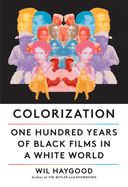
Readers may find themselves reaching for the popcorn while immersed in Colorization: One Hundred Years of Black Films in a White World. The stories that Wil Haygood tells--of pioneers, mavericks, rebels--are as gripping as anything that one might hope to see on the big screen.
Colorization is devoted to Black representation in film and the Black artists and visionaries who broke new ground in the movie business, starting with Oscar Micheaux, who made 1919's The Homesteader, the first feature-length film by a Black director. Proceeding chronologically, Haygood spotlights trailblazing Black industry players, above all Black actors, some of whom became household names ("White Americans... used [Sidney] Poitier as a yardstick to gauge race relations"). For other actors (Dorothy Dandridge, Billy Dee Williams), the fanfare that greeted their initial "crossover success" was followed by non-ringing telephones--a reflection of Hollywood's vision problem when it came to color-blind casting.
Haygood, a biographer of Sammy Davis Jr. and others, is a scrupulous researcher who is ever mindful of how what's happening on-screen mirrors what's going on off of it: the March on Washington, the Rodney King trial and so on. Haygood is also an animated writer (Spike Lee "still held tight his Captain Ahab persona, firing his harpoon at the big white whale of Hollywood") and a wry social critic: of Black-female-centered films of the post-civil-rights era, he writes, "Sheba, Baby; Claudine; Friday Foster; Coffy; Cleopatra Jones; Jackie Brown. All those Mammy roles, avenged." Colorization is a major undertaking and a major achievement. --Nell Beram, author and freelance writer

